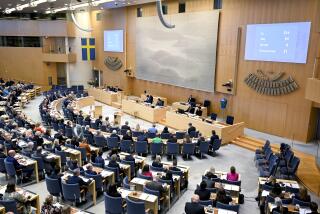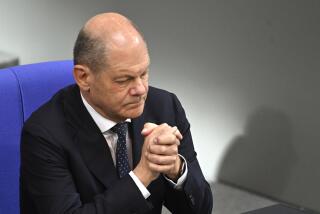Abortion Is Legalized in Germany : Law: Conservative lawmakers, defeated 357 to 284, vow to challenge the decision in court.
- Share via
BONN — Germany legalized abortion Thursday after a marathon, 14-hour parliamentary debate over the last major issue still dividing the country, both emotionally and juristically.
But conservative members of the Bundestag, or lower house of Parliament, vowed to challenge the landmark decision in court after the multi-party bill lifting abortion restrictions passed 357 to 284, with 16 abstentions.
Chancellor Helmut Kohl, a staunch Roman Catholic, remained silent during the daylong debate over seven different bills that ran the gamut from free abortions on demand to criminal prosecution for terminating pregnancy even in the case of rape or incest.
The new law requires women to seek counseling at least three days beforehand, but it allows abortion during the first trimester of pregnancy.
“We must no longer diminish, violate or disregard a woman’s dignity, responsibility and decision-making capability,” declared Bundestag leader Rita Suessmuth, who broke ranks with fellow Christian Democrat Kohl on the issue.
“The state has the duty to protect and defend life,” countered Wolfgang Zoeller, a member of the Christian Social Union, the Bavarian sister party to Kohl’s Christian Democrats. “Abortion, regardless of the reason, is and remains murder, which I want to prevent with all means at my disposal.”
Until now, only a doctor could decide whether a woman could terminate a pregnancy in western Germany, and abortion was legal only in dire medical, psychological or social circumstances.
West German women who sought abortions elsewhere risked criminal prosecution; in recent years, there have been a few cases of police arresting German women returning from neighboring Holland and forcing them to undergo gynecological examinations to see whether they had had an abortion.
The West German law, known as Paragraph 218, “belongs on the scrap heap of history,” declared Christina Schenk, a lawmaker from the east who belongs to the tiny, left-leaning Buendnis 90 party.
In Communist East Germany, legal abortions were free on demand, and every third pregnancy was terminated.
When the two countries merged on Oct. 3, 1990, no consensus was reached for a common abortion law, and the Bundestag was given two years to adopt one.
Once approved as expected by the Bundesrat, or upper house, the new law would take effect Jan. 1.
Although the issue proved nettlesome to lawmakers, it has failed to stir the kind of public passion engulfing the topic in the United States. Only a few anti-abortion protesters gathered outside the Bundestag building as the debate began Thursday, and no major demonstrations or protests were reported. A Mass for the unborn drew about 1,000 faithful to the Cologne Cathedral, and the bishop of Fulda ordered all churches in his diocese to ring their bells for 15 minutes at the start of the debate.
The decision marked another setback for Kohl, whose center-right coalition has been weakened by infighting and dwindling public support for the chancellor as the cost of rebuilding the eastern region continues to soar.
Thursday’s balloting permitted Bundestag deputies to vote their consciences instead of hewing to party lines.
Gregor Gysi, head of the small Communist Party, drew derisive laughter when he suggested that it was “presumptuous and shameful” that the 527 men in the Bundestag should determine the fate of women in a situation that they could never personally understand. He called on all male deputies to abstain. The Bundestag has 135 female deputies.
A public opinion poll of 3,000 people published in this week’s edition of the newsmagazine Der Spiegel showed that 76% supported the abortion bill that was eventually passed by the Bundestag.
More than 124,000 abortions were performed in Germany last year. The Federal Statistics Office recorded 49,806 in eastern Germany, where 7.9 million women live. That adds up to 32 abortions to every 100 live births.
More to Read
Sign up for Essential California
The most important California stories and recommendations in your inbox every morning.
You may occasionally receive promotional content from the Los Angeles Times.









